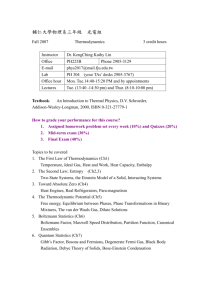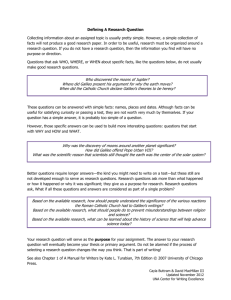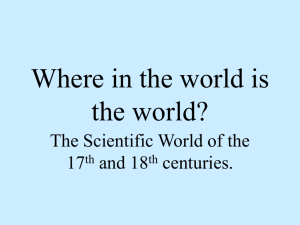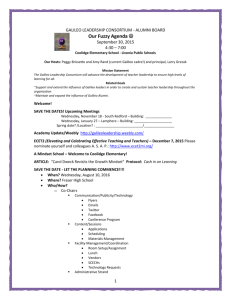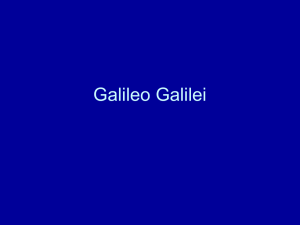15 Syllabus FYS Phys 1101
advertisement
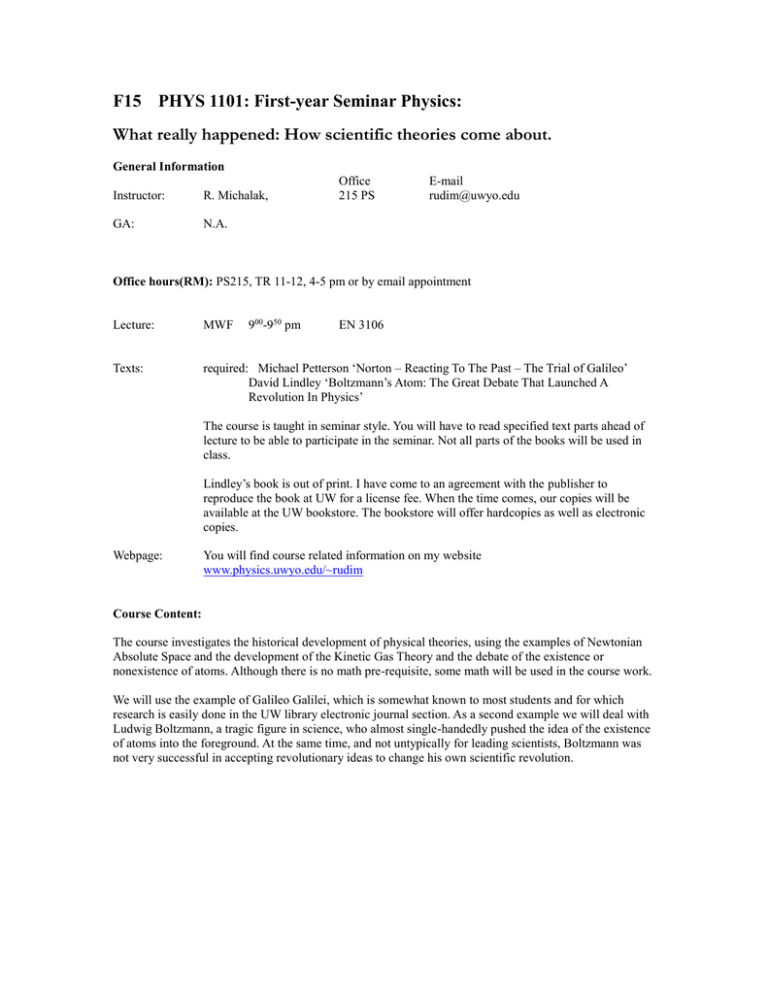
F15 PHYS 1101: First-year Seminar Physics: What really happened: How scientific theories come about. General Information Instructor: R. Michalak, GA: N.A. Office 215 PS E-mail rudim@uwyo.edu Office hours(RM): PS215, TR 11-12, 4-5 pm or by email appointment 900-950 pm Lecture: MWF EN 3106 Texts: required: Michael Petterson ‘Norton – Reacting To The Past – The Trial of Galileo’ David Lindley ‘Boltzmann’s Atom: The Great Debate That Launched A Revolution In Physics’ The course is taught in seminar style. You will have to read specified text parts ahead of lecture to be able to participate in the seminar. Not all parts of the books will be used in class. Lindley’s book is out of print. I have come to an agreement with the publisher to reproduce the book at UW for a license fee. When the time comes, our copies will be available at the UW bookstore. The bookstore will offer hardcopies as well as electronic copies. Webpage: You will find course related information on my website www.physics.uwyo.edu/~rudim Course Content: The course investigates the historical development of physical theories, using the examples of Newtonian Absolute Space and the development of the Kinetic Gas Theory and the debate of the existence or nonexistence of atoms. Although there is no math pre-requisite, some math will be used in the course work. We will use the example of Galileo Galilei, which is somewhat known to most students and for which research is easily done in the UW library electronic journal section. As a second example we will deal with Ludwig Boltzmann, a tragic figure in science, who almost single-handedly pushed the idea of the existence of atoms into the foreground. At the same time, and not untypically for leading scientists, Boltzmann was not very successful in accepting revolutionary ideas to change his own scientific revolution. First Year Seminar specifics: This course is a first-year seminar. There are no pre-reqs. You cannot withdraw from a first-year seminar without joint approval from your advisor and instructor! The course meets all six Critical & Creative thinking learning outcomes at UW: First-Year seminars are being taught for the first time this semester. As there are no examples to fall back on it is difficult to gauge what expectations students can work with. In that sense, all the planned activities are tentative and may be changed as it becomes clear what is realistic to do and what is not. 1. Access diverse information through focused research, active discussion, and collaboration with peers. - Students write an initial letter to themselves about how accurate they consider textbooks to be. - Students learn how to read a scientific text and how to search for sources in literature. - Students research the diverse historical background in the development of the Theory of Absolute Space and the Kinetic Theory of Gases. 2. Separate facts from inferences and relevant from irrelevant information, and explain the limitations of information. - Students explore dead end theories, which were in competition with Absolute Space and the Kinetic Theory and the difficulties that the establishment of the now generally accepted theories had to go through. - Students write second letter to themselves explaining why and how they changed their mind (presumably twice) about the accuracy of textbooks. 3. Evaluate the credibility, accuracy, and reliability of conclusions drawn from information. - Case study: Trial of Galileo. Students research the data Galileo had available and follow some of the arguments made in the historical trial (using the Trial of Galileo source book). - Case study: The criticism of Boltzmann’s work in contemporary science, leading to Boltzmann’s suicide. 4. Recognize and synthesize multiple perspectives to develop innovative viewpoints. Case Study Galileo: Student groups follow up with detailed discussion of the validity of each point of view in the historical trial. Case study Boltzmann: predicting the direction Thermodynamics would have taken without Boltzmann’s ultimately successful contribution. 5. Analyse one’s own and others’ assumptions and evaluate the relevance of contexts when presenting a position. - Students compare the two case studies and search for parallels, differences, and the role of assumption and context in both cases. 6. Communicate ideas in writing using appropriate documentation. - Students write two term papers (HW3, HW 4): Write a new end to Galileo’s story (see below); Write a letter from the future to Boltzmann (see below). Teaching the Research Process In this course you will complete two final projects: Writing a letter from the future to Boltzmann and writing a revised ending for Galileo’s trial. In order to be ready for this, you will have to do extensive research. Research will also be necessary for other assignments in this course (see tentative syllabus), in fact research will be an ongoing activity! In order to prepare you for doing research, special lectures are set aside in week one (‘How to read a scientific text’ and ‘Textbooks and physics models’ and week four ‘Guided Library Research’, before library based research begins in week six. The university subscribes to three online journals, which are particularly useful for our research: The American Journal of Physics, the Archive of the History of the Exact Sciences, and The British Journal for the History of Science. In addition, there are some physics journals with a very long history: The Philosophical Magazine and the Physical Review. Some of the original papers may be found here. I will also give hand-outs in class or on the course webpage that will help with gathering information. We will learn methods to discern and choose papers from these magazines that are suitable for our subject and our level of understanding, and we will learn how to extract knowledge and facts from these sources and how to cite and quote them correctly. For your final projects you will put all these techniques together and work in part alone and in part in group or peer review settings to produce strong final projects. This course follows a teaching philosophy of active and inter-active learning. You will be expected to read text passages ahead of time and you will be trained how to do so effectively. Lecture will build on this reading (i.e. will not repeat its content) and you will often go from lecture to group work, including discussion, research, and comparison of complex arguments between groups. There are significant writing and IT components to the successful completion of the course! All of the following information is tentative and I reserve the right to change any of it as seems necessary to keep the class average on course. Such changes will be announced in class. Lecture Three lectures and research sessions per week, each 50 minutes. Laboratory N/A Discussion Embedded in lecture sections. Homework The HW is due at deadlines specified in the tentative schedule below. Late submissions will not be accepted, unless there is a university excuse or a valid doctor’s note. HW that is not fully legible, has confused logic, or offers more than one solution will receive a reduced grade. HW tasks include written summaries of hand-outs and text reading assignments or discussion questions regarding the same material. Hand-outs are provided during lecture. If you miss a lecture, which provides students with a hand-out, it is your responsibility to make sure you learn about the existence of the hand-out and to collect it from me at my office in good time before the related work is due. There will be no extension of deadline because of missed hand-outs. All hw to be emailed to rudim@uwyo.edu by 9am on the due day. All hw to be submitted in MS Word format. Each task will have a unique mix of the grading categories you find below. Use the categories as a guide to the eye to get an idea what I will be looking for when I’ll grade your assignments. Writing Rubric major grading categories grades A AB+ B BC+ C CD+ D F A AB+ B BC+ C CD+ D F development of point of view effective and insightful fully appropriate reason and evidence appropriate reason and evidence appropriate reason, lacking some evidence mostly appropriate reason, lacking some evidence some appropriate reason vague or insufficient reason has at least a pov deficient pov no viable pov no attempt to develop a pov organization all of A- and highly focused perfectly organized, coherent progression of ideas all of B and some coherence generally organized and focused generally organized some lack of focus somewhat organized some problem with progression of ideas incoherent poor organization, unfocused disorganized disorganized to a degree that understanding compromised use of language A full mastery of jargon and language metrics A- some mastery of jargon, full mastery of language metrics B+ appropriate use of jargon, some mastery of language metrics B appropriate use of jargon, some lack of language metrics B- some use of jargon, some lack of language metrics C+ displays some serious lack of language metrics and/or mistakes in jargon C displays little facility of language metrics and/or mistakes in jargon C- some fundamental language errors or grave misunderstanding of jargon D+ frequent fundamental language errors D frequent fundamental language errors and grave misunderstanding of jargon F displays permanently language errors, no concept of jargon minor grading categories A AB+ B BC+ C CD+ D F sketches/figures (where necessary) clearly appropriate, no formal mistakes, very tidy appropriate, no formal mistakes, tidy appropriate, at most one minor mistake, tidy mostly appropriate or few minor mistakes mostly appropriate or few minor mistakes and untidy somewhat inappropriate figures (e.g. no axes labels, missing vector quantity) figures incomplete figures incomplete and untidy figure poorly related or extremely sloppy wrong figure/sketch no figure/sketch where necessary examples (where necessary) A clearly related insightful examples which demonstrate the model constraints A- clearly related insightful examples B+ insightful example not clearly related but in the general vicinity B clearly related example B- clearly related example, incomplete or with minor error C+ clearly related example, seriously incomplete or major error C somewhat related example or major error in clearly related exp C- unclear or incoherent example D+ wrong example D inappropriate example F no example where example necessary Grading Key I usually underline a passage and accompany it with a symbol that explains the kind of mistake: √ correct (√) mostly correct ~ somewhat correct ≈ vague (-) incomplete or sudden end missing # wrong (/) misses the point, off topic original, imaginative, good illustration :-( sloppy, much too short ˅ repetitive, wordy ? confused or logic cannot be followed or lack of focus & good research $ well organized or well structured + mature writing * precise or insightful or thoughtful ^ concise, to the point ! strong reasoning (+) furthers pov [] lack of structure or needs paragraph separation or abrupt change % evidence missing or incomplete Communication with the students I will make announcements in class when changes are made to the tentative schedule. It is the student’s duty to catch up with such news, if the student misses class. That is still true, if there is a valid university or other excuse for the student absence. On occasion, I may send an email to the class. It is the student’s duty to check the university email account in a timely manner to benefit from such information. Grades Homework: Discussion contribution, letter to self etc.: Library Research documentation: Final Project I = HW3 Final project II = HW4 2 misc. misc. 1 1 30% 15% 15% 20% 20% Scale: A > 95% A- > 90% B+ > 85% B > 80% B- > 75% C+ > 70% C > 65% C- > 60% D+ > 55% D > 50% F < 50% GPA 4.0 3.67 3.33 3.0 2.67 2.33 2.0 1.67 1.33 1.0 0.0 Academic Honesty Don’t cheat. In the long run you are only hurting your chances at succeeding at college and in the major. The actual university rules: “Academic dishonesty is defined in University Regulation 802, Revision 2 as “an act attempted or performed which misrepresents one’s involvement in an academic task in any way, or permits another student to misrepresent the latter’s involvement in an academic task by assisting the misrepresentation.” There is a well-defined procedure in place to judge such cases and serious penalties may be assessed. A short common sense interpretation of the regulation could sound something like this: If it’s not your work, don’t pretend that it is. n/b Under this University Regulation even an honest mistake is a mistake and not understanding one’s involvement in academic dishonesty is not an excuse. Unlike in some of my other courses, homework is not group work. The main point we will deal with here is possible plagiarism. During the special training lectures I will address and clarify the issue further. Special accommodations If you have a physical, learning, or psychological disability and require accommodations, please let me know as soon as possible. I will try to accommodate your condition as best as circumstances allow. You will need to register with University Disability Support Services (UDSS) in SEO, room 330 Knight Hall, 766-6189, TTY: 766-3073. If you choose to notify me late about such circumstances you forfeit your right for special accommodation for that instance. Additional help The special nature of First Year seminars makes additional help a difficult project. You are always welcome to come to office hours or make special appointments to discuss your ideas and to ask questions with/of your instructor. In addition, group work is allowed during the planning stage of an assignment. Tentative Class Schedule Fall 2015 – 1101 Week M W F Deadlines etc.: 1 Aug 31 – Sep 4 I Readg, syll How reliable are textbooks ? How to read a text. 2 Sep 7 – Sep 11 - Textbook 1: Review representation Of Newtonian Gravity 3 Sep 14 – Sep 18 Lecture discussion: Kepler Library research: Introduction with examples Textbooks and Physical Models Lecture Copernicus, Bruno, Brahe, Reading Summary and Discussion of Letter to Self Kepler – Galileo’s forerunners Library research: Paper on Galileo HW 1 due M 9/25 4 Sep 21 – Sep 25 Lecture: Galileo Sciences Handout 2: History Kinetic Theory Critical Reading Peer review draft hw1 End Galileo lecture 5 Sep 28 – Oct 2 Review: How Reliable are textbooks? What is their purpose? Review: How Would you write a textbook intro on space? Dead End theories: Caloric theory 1 6 Sep 30 – Oct 4 Library Research: Caloric Theory 7 Oct 5 – Oct 9 Library Research Atomic theory and 8 Oct 12 – Oct 16 Modern descendants: Einsteinian Spacetime 2 9 Oct 19 – Oct 23 Preliminary Group Discussion Dead End theories: Caloric theory 2 Modern descendants: Atomic Theory And Heat 2 Reviewing Evidence Group reading 4: 10 Oct 26– Oct 30 Reviewing Evidence Group reading 6: 11 Nov 2 – Nov 6 12 Nov 9 – Nov13 Reviewing Evidence Final Discussion Pt.2 Letter reply to self: due9/28 What should texts cover about the Galileo story for stude understand the scope of Mechanics? Tentative from this week on HW2 Contrast Dead End theories with modern descendants (creative Writing) Group reading 3: Reviewing Evidence Group reading 5: Intermediary Group Discussion midterm 23rd Nov 1 last day to withdraw midterm grades due on Oct28th Reviewing Evidence Group reading 7: Reviewing Evidence Assign Groups: Dealing with evidence From the counter arg. 13 Nov16 – Nov20 Why did Boltzmann Suicide? 1 Why did Boltzmann Suicide? 2 14 Nov23 – Nov27 Why did Boltzmann Suicide? Discussion - 15 Nov 30 – Dec 4 How scientific theories Come about: An open Discussion 1 How scientific theories Come about: An open Discussion 2 Dec 14 – Dec 18 Modern descendants: Atomic Theory And Heat 1 HeatModern descendants: Einsteinian Spacetime 1 Group reading 1: Boltzmann Reviewing Evidence Group reading 2: Letter to self: 9/4 Final Discussion Pt.1 Library Research advising week, get your PERC HW3 11/23 Re-write the history of Galileo’s Trial with your personal favourite outcome. Why did Boltzmann Suicide? 3 - Thanksgiving break 27t – 29rd How scientific theories Come about: An open HW4 12/7 Give Boltzmann something to live for: Discussion 3 A letter from the future. N/A Two final projects: HW 3 – re-write the history of the Galileo Trial with your personal favourite outcome, based on plausible contemporary or earlier scientific discoveries Galileo may not have known about or based on scientific discoveries in the same time period but slightly later than the trial. The project will be graded with a view to the logical development of ideas and supporting evidence. HW4 - Write a letter from the future to Boltzmann, giving him a reason to live. Explain the big contribution his work will make to science. Give three examples from different fields of science where Boltzmann’s Kinetic Theory and the microscopic formulation of entropy have influenced the direction of the field.
